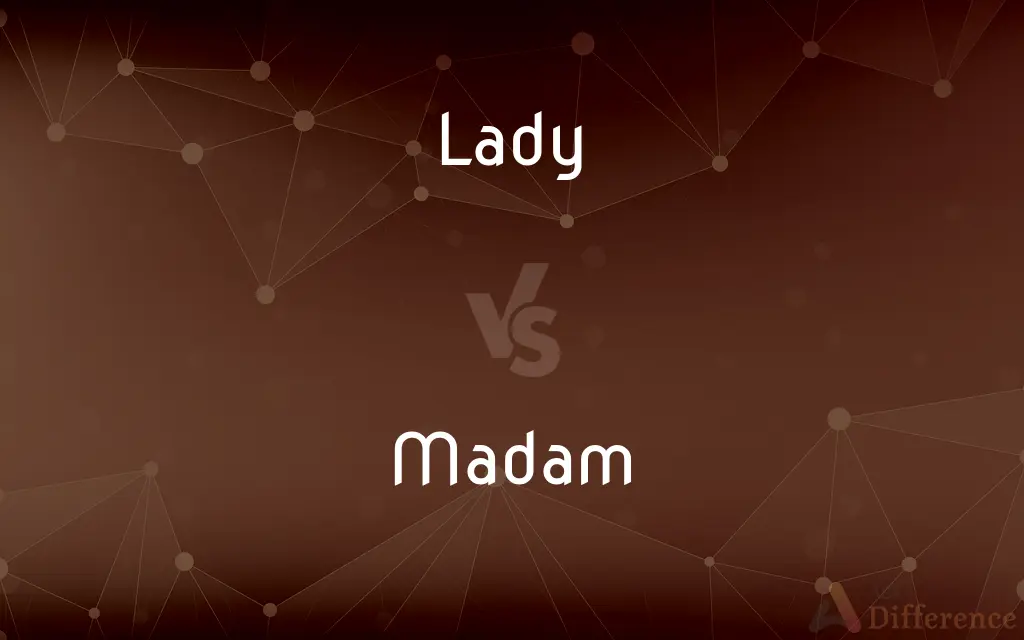Lady vs. Madam — What's the Difference?
By Tayyaba Rehman — Updated on November 2, 2023
"Lady" refers to a polite or formal term for a woman, often of high social rank, while "Madam" is a respectful title for a woman, especially used to address those of higher status or age.

Difference Between Lady and Madam
Table of Contents
ADVERTISEMENT
Key Differences
Lady is a term used to refer to a woman, often with an emphasis on manners and respectability. It can denote a woman of high social standing or noble birth. Madam, alternatively, is a formal title used to address a woman, often one who is unknown to the speaker, or in professional contexts, such as a female store manager or the proprietor of an establishment.
The term lady is also used as a title for the wife or widow of a knight or baronet, linked to British nobility. Madam, on the other hand, may be used more broadly and is often the equivalent of "sir" when addressing males, showing deference to the person being addressed.
In modern use, lady can sometimes be perceived as old-fashioned or patronizing when referring to a woman in general, while madam is still widely used in formal business settings and correspondence as a sign of respect. However, both terms carry a sense of politeness and formality.
Lady has connotations of refinement and elegance, often associated with ladylike behavior, which denotes a woman who behaves in a traditionally polite and proper way. Madam, while respectful, does not inherently carry these connotations of behavior or personal qualities.
The use of lady and madam may vary regionally and culturally. In the United States, lady is commonly used in general reference to a woman, while madam is less common and more formal, often reserved for specific formal or professional interactions.
ADVERTISEMENT
Comparison Chart
Formality
Formal, but less so than madam.
More formal, used in titles.
Usage Context
Social settings, nobility titles.
Professional settings, addressing.
Connotations
Elegance, refinement.
Professional respect.
Social Rank
Implies higher social standing.
Does not imply social rank.
Cultural Prevalence
Common in general use.
More formal and less common.
Compare with Definitions
Lady
A woman of high social standing or refinement, especially when viewed as dignified or well-mannered.
Madam
Used to address a woman in a position of authority.
Can I help you, madam?
Lady
A refined and well-mannered woman.
She is a lady in both poise and speech.
Madam
A formal title used to address a woman.
Madam President, the meeting is about to begin.
Lady
A woman who is the object of chivalrous devotion.
He dedicated the song to his lady love.
Madam
A respectful form of address for female customers.
Your table is ready, madam.
Lady
The word lady is a term of respect for a girl or woman, the equivalent of gentleman. Once used to describe only women of a high social class or status, the female equivalent of lord, now it may refer to any adult woman.
Madam
An older or married woman.
Madam, may I escort you across the street?
Lady
A woman who is the head of a household
Is the lady of the house at home?.
Madam
Madam (), or madame ( or ), is a polite and formal form of address for women, often contracted to ma'am (pronounced in American English and in British English). The term derives from the French madame (French pronunciation: [maˈdam]); in French, ma dame literally means "my lady".
Lady
A woman, especially when spoken of or to in a polite way
Ladies, may I show you to your table?.
Madam
Pl. Mes·dames (mā-dăm, -däm) Used formerly as a courtesy title before a woman's given name but now used only before a surname or title indicating rank or office
Madam Ambassador.
Lady
Used as a form of address for a woman, often with sarcasm or irritation
Look, lady, I was ahead of you in line.
Madam
Used as a salutation in a letter
Dear Madam or Sir.
Lady
A woman who is the object of romantic or chivalrous love
A knight serving his lady.
Madam
Madam Used as a form of polite address for a woman
Right this way, madam.
Lady
(Informal) A wife or girlfriend
A man kissing his lady at the airport.
Madam
Madam The mistress of a household.
Lady
A lady in waiting
The queen and her ladies.
Madam
Madam A woman who manages a brothel.
Lady
A general feminine title of nobility and other rank, specifically as the title for the wife or widow of a knight or baronet.
Madam
A polite form of address for a woman or lady.
Mrs Grey wondered if the outfit she was trying on made her look fat. The sales assistant just said, “It suits you, madam”.
Later, Mrs Grey was sitting in her favourite tea shop. “Would madam like the usual cream cakes and patisserie with her tea?” the waitress asked.
Lady
Used as a form of address for a woman of high rank, especially for a marchioness, countess, viscountess, baroness, or baronetess.
Madam
The mistress of a household.
Lady
Lady The Virgin Mary. Usually used with Our.
Madam
(colloquial) A conceited or quarrelsome girl.
Selina kept pushing and shoving during musical chairs. The nursery school teacher said she was a bad-tempered little madam.
Lady
(historical) The mistress of a household.
Madam
(slang) A woman who runs a brothel, particularly one that specializes in finding prostitutes for rich and important clients.
After she grew too old to work as a prostitute, she became a madam.
Lady
A woman of breeding or higher class, a woman of authority.
"I would like the dining room to be fully set by tonight; would you do so?" "Yes, my lady".
Madam
An irritable, conceited, or contemptous woman. (used as a general term of abuse).
Lady
The feminine of lord.
Madam
(transitive) To address as "madam".
Lady
A title for someone married to a lord or gentleman.
Madam
A gentlewoman; - an appellation or courteous form of address given to a lady, especially an elderly or a married lady; - much used in the address, at the beginning of a letter, to a woman. The corresponding word in addressing a man is Sir; often abbreviated ma'am when used as a term of address.
Lady
A title that can be used instead of the formal terms of marchioness, countess, viscountess, or baroness.
Madam
The woman who is in charge of a household.
Lady
A woman: an adult female human.
Please direct this lady to the soft furnishings department.
Madam
The woman who is in charge of a brothel.
Lady
(in the plural) A polite reference or form of address to women.
Ladies and gentlemen, it is a pleasure to be here today. Follow me, ladies!
Madam
A woman of refinement;
A chauffeur opened the door of the limousine for the grand lady
Lady
(slang) Used to address a female.
Hey, lady, move your car!
Hey, ladies, how are you doing?
Madam
A woman who runs a house of prostitution
Lady
(ladies' or ladies) Toilets intended for use by women.
Madam
A term used for a woman who runs a brothel.
The madam kept a close eye on her establishment.
Lady
(informal) A wife or girlfriend; a sweetheart.
Lady
A woman to whom the particular homage of a knight was paid; a woman to whom one is devoted or bound.
Lady
(slang) A queen the playing card.
Lady
Who is a woman.
A lady doctor.
Lady
(Wicca) Lady.
Lady
(archaic) gastric mill, the triturating apparatus in the stomach of a lobster, consisting of calcareous plates; so called from a fancied resemblance to a seated female figure.
Lady
A five-pound note. (Rhyming slang, Lady Godiva for fiver.)
Lady
A woman’s breast.
Lady
A queen.
Lady
To address as “lady”.
Lady
A woman who looks after the domestic affairs of a family; a mistress; the female head of a household.
Agar, the handmaiden of Sara, whence comest thou, and whither goest thou? The which answered, Fro the face of Sara my lady.
Lady
A woman having proprietary rights or authority; mistress; - a feminine correlative of lord.
Of all these bounds, even from this line to this, . . . We make thee lady.
Lady
A woman to whom the particular homage of a knight was paid; a woman to whom one is devoted or bound; a sweetheart.
The soldier here his wasted store supplies,And takes new valor from his lady's eyes.
Lady
A woman of social distinction or position. In England, a title prefixed to the name of any woman whose husband is not of lower rank than a baron, or whose father was a nobleman not lower than an earl. The wife of a baronet or knight has the title of Lady by courtesy, but not by right.
Lady
A woman of refined or gentle manners; a well-bred woman; - the feminine correlative of gentleman.
Lady
A wife; - not now in approved usage.
Lady
Any woman; as, a lounge for ladies; a cleaning lady; also used in combination; as, saleslady.
Lady
The triturating apparatus in the stomach of a lobster; - so called from a fancied resemblance to a seated female figure. It consists of calcareous plates.
Lady
Belonging or becoming to a lady; ladylike.
Lady
A polite name for any woman;
A nice lady at the library helped me
Lady
A woman of refinement;
A chauffeur opened the door of the limousine for the grand lady
Lady
A woman of the peerage in Britain
Lady
A polite term for any woman.
The lady at the store was very helpful.
Lady
A woman of high social rank.
The lady of the manor is hosting the gala tonight.
Lady
The female equivalent of a gentleman.
He was charmed by the lady he met at the dance.
Common Curiosities
Is it appropriate to call a young girl madam?
It's unusual; "miss" is more common for girls.
What denotes a woman as a lady?
Social standing, behavior, or simply as a respectful term for a woman.
Can any woman be called a lady?
Generally, yes, as a sign of respect.
Is madam still commonly used today?
Yes, in formal and professional contexts.
Does lady carry noble implications?
It can, particularly in British English.
What’s the male counterpart of madam?
Sir.
Can lady be used in professional titles?
Rarely, it's usually informal.
Would a woman in authority always prefer madam over lady?
It depends on personal preference and the formality of the situation.
In what setting is madam preferred?
Formal business or when showing respect in service industries.
Are the terms lady and madam interchangeable?
Not always, due to different connotations and contexts.
How should I decide whether to use lady or madam?
Consider the formality of the situation and regional customs.
Are there modern alternatives to lady and madam?
"Ms." is commonly used as a modern, neutral alternative.
Is it offensive to call someone lady?
Context matters, but it's usually not offensive.
Can the use of madam be considered outdated?
It depends on cultural and regional norms.
Does madam imply marital status?
Not necessarily, though historically it could.
Share Your Discovery

Previous Comparison
Nontransient vs. Transient
Next Comparison
Logo vs. EmblemAuthor Spotlight
Written by
Tayyaba RehmanTayyaba Rehman is a distinguished writer, currently serving as a primary contributor to askdifference.com. As a researcher in semantics and etymology, Tayyaba's passion for the complexity of languages and their distinctions has found a perfect home on the platform. Tayyaba delves into the intricacies of language, distinguishing between commonly confused words and phrases, thereby providing clarity for readers worldwide.















































